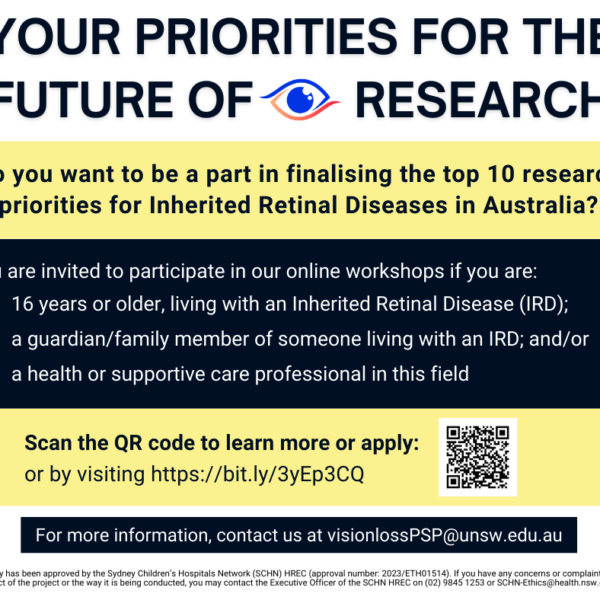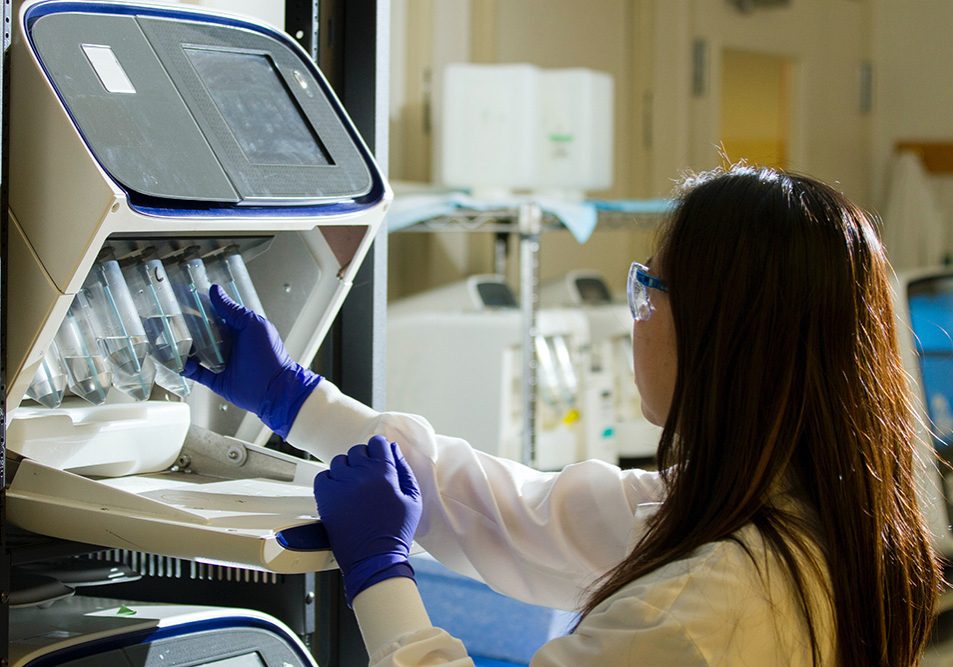10 June, 2024
The Inherited Retinal Disease Priority Setting Partnership
The Inherited Retinal Disease Priority Setting Partnership, previously known as the Vision Loss Priority Setting Partnership (PSP), is now complete and has identified the top 10 research priorities from the perspective of individuals living with an inherited retinal disease, guardians/family members, and health professionals caring for these individuals.
You can find the results of this project here.

We are a team of scientists and clinicians who work in inherited retinal disease and in supporting individuals living with a chronic health condition
and their families. We are associated with the Children’s Medical Research Institute the University of Sydney and the University of New South Wales. We value the voice of those impacted by an inherited retinal disease whether a patient, carers, family or friends as well as their healthcare professionals. We are undertaking a James Lind Alliance priority setting partnership to identify the top 10 research priorities for the diagnosis and treatment of inherited retinal disease. A priority setting partnership is a structured process that involves a survey to collect questions that those impacted by an inherited retinal disease and Healthcare professionals would like answered by research. We will then work through all of the questions submitted to identify which ones require research to answer. Then there is a second survey where those impacted by an inherited retinal disease and healthcare professionals are invited to rank the most common questions based on importance. Finally there’s a workshop where those impacted by an inherited retinal disease and healthcare professionals come together to discuss and finalise the top 10 priorities for research. Typically research topics are dictated by the interests of researchers and the pharmaceutical companies. As our understanding about inherited retinal disease grows it is important that we are focusing our efforts and precious research funds on what matters most to those impacted by an inherited retinal disease. The top 10 priorities from this project will be shared with funders research teams and organisations and the public so that research can be as meaningful as possible to the people who need it. There are many opportunities to be involved in this project. You may wish to contribute to one of the two surveys or both or attend the workshop. You may also wish to contribute to the wider project as a member of our Steering group you’re helping raising awareness of this work and sharing any of our findings will also be extremely valuable. Together we can influence the future of research into the diagnosis and treatment of inherited retinal diseases. If you have any questions or would like to contribute to this project please contact us at visionlossPSP@unsw.edu.edu
What does this PSP involve?
A PSP is a specific method developed by the James Lind Alliance to develop a ‘Top 10’ list of unanswered research questions/topics. This project aims to identify the research priorities about inherited retinal disease that align with what matters most to patients, carers and health professionals.
There are three parts of this PSP that you can be a part of:
1. Participating in the first survey (COMPLETE)
- In this short, anonymous survey, you will be asked to share any questions or topics that you think researchers should focus on regarding Inherited Retinal Diseases.
2. Participating in the second survey (COMPLETE)
- Using the responses from Survey 1, you will be asked to rank a list of about 30 questions or topics that you think researchers should prioritise.
3. Participating in the final workshop (COMPLETE)
- Two surveys have been undertaken to obtain a list of questions that individuals living with an inherited retinal disease would like answered by research.
- Expressions of interest are invited to participate in two online workshops to finalise our Top 10 list of research priorities. These will be held online on 8th and 9th August. Expressions of interests will be accepted until the 30th of June.
- If you are selected to participate and are attending as someone with lived experience, you will be reimbursed for your time at $40 per hour via gift card.
Who is conducting the Vision Loss Priority Setting Partnership?
The Stem Cell Medicine Group at Children’s Medical Research Institute is collaborating with researchers at the Behavioural Sciences Unit and University of New South Wales to undertake this Vision Loss Priority Setting Partnership (PSP).
This project is being led and managed by a Steering Committee that includes individuals with lived experience of an Inherited Retinal Disease, health professionals and researchers.
- PSP Lead – The Vision Loss PSP will be coordinated by Dr Eden Robertson, Behavioural Scientist, UNSW Sydney / Sydney Children’s Hospitals Network – Randwick.
- James Lind Alliance (JLA) Advisor – The Vision Loss PSP will be supported and guided by Louise Dunford.
- Retina Australia’s Chair, Leighton Boyd AM, and CEO, Julia Hall, both sit on the Vision Loss Priority Setting Partnership Steering Committee.
- Watch the video below to see the other members of the Steering Committee group.
We are proud to announce our vision loss priority setting partnership Steering group members with patient, caregiver, health professional and researcher scientist representatives.
Meet our vision loss PSP Steering group members associate professor Lauren Ayton from the University of Melbourne and
Center for Eye research Australia, Leighton Boyd AM from Retina Australia and a patient consumer, Hollie Feller from Usher Kids Australia
as well as a parent consumer, Dr Anai Gonzalez Cordero from Children’s Medical Research Institute and the University of Sydney, Julia Hall from Retina Australia, Dr Kate Hetherington from UNSW Sydney in the Sydney Children’s Hospitals Network Randwick, Professor Robin Jamieson from Children’s Medical Research Institute CD Children’s Hospitals Network and Save Sight Institute University of Sydney, Sally Carr Andrews from Blind Citizens Australia and patient consumer Dr Alan Ma from the Sydney Children’s Hospitals Network Westmead, Dr Meredith Prain from Able Australia SensesWA and a patient consumer, Dr Eden Robertson from UNSW Sydney as well as the Sydney Children’s Hospitals network round week Emily Shepard from Usher Kids Australia and a parent consumer and professor Matthew Simanovic from Save Sight Institute the University of Sydney.
Any questions contact us at vision loss PSP unsw.edu.edu on Twitter at vision loss PSP or calling us Monday to Tuesday only on Plus 612-9348-0708
Contact
For further information you can contact the research team at visionlossPSP@unsw.edu.au or head to the Vision Loss PSP website.
https://retinaaustralia.com.au/contribute-to-the-future-of-research/
Other Blogs

Autosomal Dominant Optic Atrophy Webinar
Supporting people affected by mitochondrial disease Many types of mitochondrial disease (mito) can lead to progressive vision loss and blindness....

World Research Summary by Dr Catherine Civil
Hot Off The Press A very Happy New Year to you all, and may 2026 bring us another step closer to...

World Geographic Atrophy Day 2025
A New Era of Hope for Vision Preservation Geographic Atrophy (GA), a progressive and irreversible form of advanced age-related macular degeneration (AMD), has long been a...
